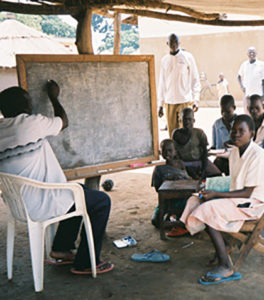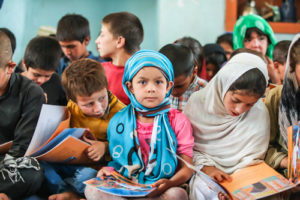Illiteracy rising among children in conflict, disaster zones – report
 Illiteracy among young people is almost three times as high in countries hit by war or disaster than in stable nations and women and girls are worst affected, according to a new United Nations report.
Illiteracy among young people is almost three times as high in countries hit by war or disaster than in stable nations and women and girls are worst affected, according to a new United Nations report.
The report, by the UN children’s agency UNICEF, says nearly three in 10 young people aged between 15 and 24 living in countries afflicted by war or disaster are illiterate.
It says, Niger, in West Africa, has the world’s highest rate of youth illiteracy, with 76 percent of 15 to 24-year-olds unable to read or write.
War-torn Chad, South Sudan and the Central African Republic are not far behind, with youth illiteracy rates of 69 percent, 68 percent and 64 percent respectively.
The report says one in four young people are unable to read in sub-Saharan Africa and 33 million children are out of primary school, more than half of all those in the world.
It says poor education in turn feeds unemployment, radicalisation and migration – with thousands of young people joining militant groups such as Boko Haram in Nigeria or risking the deadly journey across the Mediterranean in the hope of finding jobs.
Girls miss out on schooling more often than boys, with 33 percent of girls and young women in 27 countries affected by war or disaster unable to read or write, compared to 24 percent of young men and boys, it says.
The report says that although global literacy rates are rising, 750 million adults are illiterate; two-thirds of these people are women. 
UNICEF Executive Director Henrietta Fore said illiterate children were amongst the world’s most vulnerable people.
“An uneducated child who grows into an illiterate youth in a country ripped apart by conflict or destroyed by disasters may not have much of a chance,” Ms Fore said.
The report comes as French President Emmanuel Macron and Senegal’s President Macky Sall are due to open a conference on Thursday in Senegal’s capital, Dakar, to raise money for the Global Partnership for Education, a fund aiming to ensure all children go to school.
A separate recent study in Liberia, also in West Africa, found armed conflict affected all aspects of childhood development, including physical, mental and emotional wellbeing.
The report by Graça Machel, an Expert of the Secretary General of the United Nations, said war in Liberia had also taken a heavy toll on the healthcare system through the loss of facilities and infrastructure, supplies and equipment, and of physicians and nurses, while the economic hardships of war have resulted in fewer resources for healthcare.
It said that when children experience traumatic or other events in times of war, they may suffer from increased anxiety about being separated from their families, or they may have nightmares or trouble sleeping.
The report children in conflict zones often ceased playing and laughing, lost their appetites and withdrew from contact.
Children also may have difficulty concentrating in school. Older children and adolescents may become anxious or depressed and harbor feelings of hopelessness about the future or develop aggressive behavior, the report said.
Laurie Nowell
AMES Australia Senior Journalist












